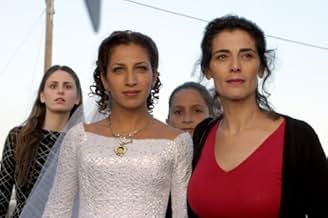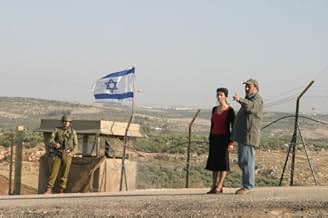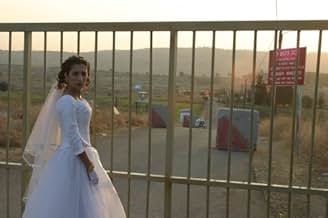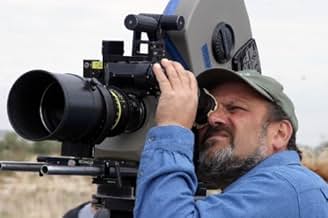In Majdal Shams, the largest Druze village in Golan Heights on the Israeli-Syrian border, the Druze bride Mona is engaged to get married with Tallel, a television comedian that works in the ... Read allIn Majdal Shams, the largest Druze village in Golan Heights on the Israeli-Syrian border, the Druze bride Mona is engaged to get married with Tallel, a television comedian that works in the Revolution Studios in Damascus, Syria. They have never met each other because of the occup... Read allIn Majdal Shams, the largest Druze village in Golan Heights on the Israeli-Syrian border, the Druze bride Mona is engaged to get married with Tallel, a television comedian that works in the Revolution Studios in Damascus, Syria. They have never met each other because of the occupation of the area by Israel since 1967; when Mona moves to Syria, she will lose her undefi... Read all
- Awards
- 8 wins & 15 nominations total
- Amal
- (as Hiyam Abbass)
- Hammed
- (as Makram J. Khoury)
- Marwan
- (as Ashraf Barhoum)
- Evelyna
- (as Evelyne Kaplun)
- Amin
- (as Adnan Trabshi)
- The Mother
- (as Marlene Bajjali)
- Simon
- (as Uri Gabriel)
- Joseph
- (as Robert Hoenig)
- Director
- Writers
- All cast & crew
- Production, box office & more at IMDbPro
Featured reviews
The intended couple, however, is not the focus as much as the family dynamics that become ignited by the wedding. The patriarch is Hammed, a political activist on probation, and he has two sons - Hattem, who has been cast out by the conservative religious cabal for leaving the country and marrying a Russian woman, and Marwan, who provides the comedy relief as a womanizing salesman. The glue of the family, however, is provided by eldest sister Amal, who defiantly stands up to the men in her family and wants to get her bachelor's degree in Haifa. The first hour deals mainly with the standard pre-wedding confusion, though it happens to take place on the same day that Syrian President Bashar al-Assad succeeded his father, but the last half-hour takes place entirely at the Israel-Syria border crossing where the officials from both countries refuse to cooperate with a negotiating Red Cross worker in allowing Mona to enter Syria.
With its primarily somber tone, this is no Middle Eastern derivative of "My Big, Fat Greek Wedding", but Riklis and co-screenwriter Suha Arraf supply genuine warmth toward the characters and bring immediacy and credibility to the personal situation at hand. The acting is solid with Hiam Abbass the standout as Amal. There are nice turns by Makram Khoury as Hammed, his real-life daughter Clara as Mona, Eyad Sheety as Hattem and Ashraf Barhom who steals scenes as the gap-toothed Marwan. Special mention should be made for Michael Wiesweg's expert cinematography which perfectly captures the mostly sun-baked terrain. This is a case where the 2006 DVD package from Koch Lorber is invaluable for the context it provides to the movie's story. The making-of featurette, an extensive interview with Riklis and his accompanying commentary all help considerably in understanding the political situation that both drives and reflects the wedding preparation complications. Also included is the original trailer as well as the U.S. version.
The acting is superb, especially that of Markam Khoury as the father of the bride, Hiyam Abbas as the independent older sister and, of course, Klara Khoury as the Syrian Bride herself. The movie is quadrolingual, and sorta has Hebrew take a back seat. It's mostly in Arabic, and also has some English, Russian and a few words of French. Most viewers will probably be doing quite a lot of reading (subtitles) in this movie, but it's worth it.
The year of 2004 was an amazingly productive one for Israeli cinema, and The Syrian Bride is no exception. You do not want to miss this one.
The Druze are a minority within a minority. Most of them consider themselves Arab, but they are not truly Muslim--they have their own religion and their own rituals. Some Druze have more or less integrated themselves into Israeli society, but the family portrayed in the movie consider themselves Syrian. They demonstrate solidarity with the Syrians whom they can see and hear across the border. However, crossing the border into Syria is difficult, and returning is impossible.
While the Israelis and the Syrians soldiers eye each other with hostility across the barbed wire, Amal, a young woman--the very beautiful Hiam Abbass--is attempting to cross from the Golan Heights into Syria to marry a man she has never met. Because of the regulations, she will never see her family again. This sad and bizarre situation is played out against a backdrop of family antagonisms, bureaucratic incompetence, and petty malevolence. Amal's father Hammed--Makram Khoury--has to walk a fine line between saying goodbye to his daughter and resisting the Israeli military attempts to silence him. Hammed's other daughter, Mona--played by Khoury's real-life daughter Clara Khoury--is trapped in a loveless marriage, and is trying to simultaneously comfort her sister and achieve her own independence.
Nothing goes right, despite the efforts of a harassed U.N. official, who has seen her share of bizarre border incidents and by now has apparently accepted as commonplace the absolute madness taking place all around her.
There were a few comic elements in the movie, but I see it as a tragic film about a tragic situation. "When kings fall out, poor people tremble." The characters in this film are trapped in a toxic situation that they didn't create and can't control. As always, the wars of bullets and of words play themselves out in the lives of people who are simply trying to lead a reasonably normal and happy life.
Co-writers Suha Arraf (a Palestinian journalist) and Israeli director Eran Riklis pile almost too much on to this one Druze (Israeli Arab) family living in the occupied Golan Heights in order to make the personal political. The tensions, poignancy and symbolism of a wedding are heightened because when this bride leaves her home for her arranged marriage with a Syrian celebrity, she will not be able to return home.
Every complicated character has a complicated background, whether theirs or their parents' politics or their religiosity or their dress or their educational or romantic aspirations-- and is in a complicated relation to every other character and the authorities.
In addition to the return of prodigal sons from overseas, the larger community intrudes on the intra-family tensions, from robed tribal elders and the police who each bring warnings of proper behavior to a comical videographer. My dependency on English subtitles lessened some of the impact of hearing characters switch from Arabic to Hebrew to French to Russian to English to communicate, as part of the interactions are based on who can understand different languages and who can't. This complex in-gathering all symbolically happens the same day as a demonstration in support of the change over of power in Syria from the father the dictator to the son, while a flat tire leads to a crucial delay. The ubiquitous television, and government attention, however, is focused on the West Bank, making this border a forgotten zone as well as a no (wo)man's land.
What makes it all hang together amidst this human comedy is the central focus from the start to the finish on the almost silent bride, dressed in Western white, and her more verbal older sister, rebelliously in slacks, and both played by powerful actresses. Each has made choices in the past they regret and each chooses their future now, despite the efforts of all their male relatives, let alone global politics, to thwart them and make them helpless.
Even with the heavy-handed baggage of all the "Crash"-like coincidences, the film beautifully makes the point that politics isn't just ideology but affects how people get on with the basics of their lives.
Did you know
- TriviaMakram Khoury and Clara Khoury are father and daughter in the film as well as in real life.
- GoofsMona's father says he has raised her for 25 years. However, she states her birth date as November 30th 1976 and the movie is set on July 17th 2000. That would make her only 23 years old.
- ConnectionsFeatured in The Making of The Syrian Bride (2005)
- SoundtracksBride Theme
Music Composed & Conducted by Cyril Morin
Performed by Bulgarian Symphony Orchestra-Sif 309
- How long is Syrian Bride?Powered by Alexa
Details
- Release date
- Countries of origin
- Official sites
- Languages
- Also known as
- Syrian Bride
- Filming locations
- Production companies
- See more company credits at IMDbPro
Box office
- Gross US & Canada
- $380,505
- Opening weekend US & Canada
- $7,235
- Nov 20, 2005
- Gross worldwide
- $1,522,967
- Runtime1 hour 37 minutes
- Color
- Sound mix
- Aspect ratio
- 2.35 : 1
Contribute to this page

































